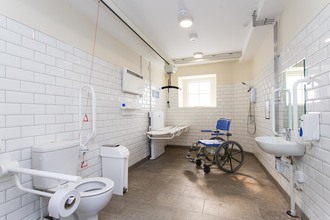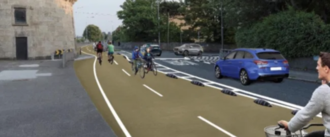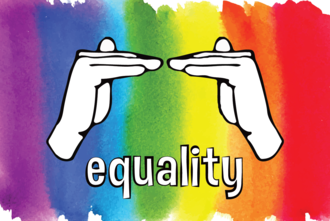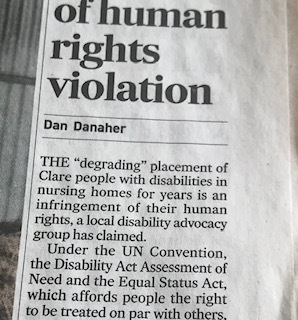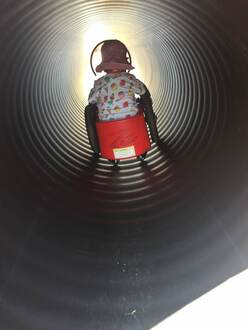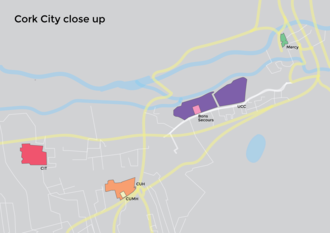- Featured
- Animal Rights
- Anti-racism
- Arts & Culture
- Children
- Climate
- Corporate accountability
- Crime
- Disability rights
- Economic
- Education
- Environment
- Food and Sustainable Production
- Gender Equality
- Governance and Transparency
- Health
- Housing
- LGBT Rights
- Mental health
- Northern Ireland
- Planning
- Privacy and Data Protection
- Rural Inequality
- Social Justice
- Trade
- Transport and Infrastructure
- Workers' Rights
- More
-
Make Changing Places Toilet Facilities Mandatory in Public BuildingsImagine being in permanent lockdown. This is the reality for thousands of children and adults with disabilities who are restricted in where they can go and what they can do because they will not find a toilet with the equipment they need. They often have to go through the indignity of being changed on the floor of a public toilet or stay isolated from their communities at home. Imagine not being able to find a toilet when you need to. Changing Places Toilet Facilities are different from standard accessible toilets. They provide extra equipment like a hoist and an adult sized changing bench. In Ireland there are only 15 Changing Places Toilet Facilities. There are over 1500 in England and new legislation will make Changing Places Toilets mandatory in new public buildings from 2021. In Northern Ireland there are approximately 40 and the NI Assembly is now following England and has committed to amending their building regulations. The Irish Government should follow the example of England and change Irish building regulations to ensure Changing Places Toilet Facilities are mandatory in public buildings. Without Changing Places Toilet Facilities available throughout the country people with disabilities are denied a basic human right and continue to be excluded from everyday life. #WeAllGottaGo7,819 of 8,000 SignaturesCreated by Changing Places Ireland
-
Don't leave Disabled Drivers and Passengers without TransportIn 2013, the Motorised Transport Grant and the Mobility Allowance were both suspended. As a result, many people, especially in rural areas were left with no means of transport. in 2020, there are over 170 people waiting for the Primary Medical Certificates needed to access the Disabled Driver and Disabled Passengers Scheme, but these have also been suspended pending a Supreme Court Ruling. We do not have a public transport system that facilitates the full-participation of people with disabilities. At the same time, access to private transport is being held up by what Finance Minister Pascal O'Donohue claims are, 'complex legal and policy issues',447 of 500 SignaturesCreated by Padraic Hayes
-
Stop Development on Gallwey's Hill TramoreThe former owner of this site should be commemorated as someone who triumphed over adversity, by dedicating this iconic viewing spot in Tramore to those who struggle due to exclusion. An accessible community garden with coffee shop would offer all in the town and beyond, a space and workplace for inclusion along with environmental appreciation.910 of 1,000 SignaturesCreated by Una Dunphy
-
Trial Strand road one way and close off rat running for local residents without delayIn these times of Covid19 this will also help people to commute, get to school and exercise safely. Will provide a much nicer environment for the people in Sandymount similar to what has happened in Blackrock and DunLoaghaire. Will mean an end to the traffic jams we're seeing at rush hour. Will provide almost continuous cycle track along the south Dublin coast from Sandymount to Sandycove allowing kids, families and older people to move about safely.979 of 1,000 SignaturesCreated by Sean Barry
-
Stop quarry application near new special needs schoolThe noise pollution, dust, and traffic a quarry only 1/2 a kilometre away from the school would create throughout the day would be detrimental to the peaceful, quiet, and healthy learning environment needed for students with special needs. This is a new school being built, and nearly completed, at a location designed especially for these special students with various disabilities. The quarry application must be denied as such to protect the rights of these disabled students with special needs.935 of 1,000 SignaturesCreated by Tracy McGinnis
-
Restrictive Intervention and seclusion of children and young people with additional needs; NISchools across Northern Ireland are entrusted with the learning and well being of some of the most vulnerable children into their care. The recent private member's motion tabled by Alliance Party's Mr Chris Little, Member of Local Assembly and Department of Education Committee Chair, highlights the need to discuss the use of unregulated restrictive interventions and seclusion applied to children with additional needs and learning disabilities across schools in Northern Ireland. As a parent of a child who experienced unregulated restraint and seclusion in his previous special school, I would encourage you to consider the everyday harm caused by restraint and seclusion. I urge you to understand the importance of addressing this issue and to take action by asking your MLA to support the motion as an urgent non- political matter which affects all children and young people in receipt of education and support services. The current policies for managing behaviours of concern in schools stem from disciplinary guidance which is used to deal with misbehaviour or truancy. In practice this means children with additional emotional and support needs routinely experience restrictive interventions that range from coercive practices, to restraint and seclusion (including use of dark rooms) to manage and control behaviours of concern, frequently described as "challenging behaviour". Restrictive intervention are often applied without malice, as a result of training provided to schools and support staff. Such training is reportedly delivered to train teachers and support staff in how to intervene with children by the use of restraint or seclusion in a crisis. However, lack of adequate resourcing reportedly results in the use of 'crisis management' strategies on a daily basis - without regulation, recording or reporting to parents and families. This causes distress and everyday harm for our children and young people. Deescalation training and low arousal approaches such as those outlined by Professor Andy McDonnell (www.studio3.org) are examples of alternative strategies best suited to a child-friendly educational environment. These techniques offer an earlier intervention approach to support and reduce the need for hands on or confrontational and distressing physical interventions. Low arousal approaches to support prevent everyday harm. In contrast the reliance on the use of restraint or seclusion in health, social care and schools has been shown to traumatise children and young people who are often already vulnerable due to disabilities. There have to date been several reports published on the significant physical injuries, emotional trauma, and in some tragic cases even death. Reports below from Ireland and UK:- https:///www.challengingbehaviour.org.uk/driving-change/rrisclaunch.html http://www.inclusionireland.ie/content/news-items/1707/launch-shining-light-seclusion-and-restraint-schools Scotland and England have been campaigning on the prevention of restraint and seclusion. Beth Morrison of PABSS/ICARS worked alongside the University of Warwick analysing case studies from many families where their children had experienced significant harm on a daily basis by the use of restraint or seclusion in the course of their education. The harrowing findings of this report was launched at the House of Lords by Lady Sheila Hollins in February. The Department of Education have a Nurture Initiative to support the social and emotional needs of children with behaviour difficulties, which might otherwise create barriers in their education. We ask that restraint and seclusion be eradicated from all but last resort/crisis interventions. Instead of restrictive practices, ''nurturing'' children and young people with additional needs and learning disabilities seeks to provide a hands off, harm free environment. Thank you for supporting children and young people with additional support needs and intellectual disabilities, ensuring a safer, supported education where every child can thrive. Show your support on Twitter #EverydayHarm. See the British Association of Social Work NI's Twitter post - in opposition to restrictive interventions bit.ly/2Pe5IE0 and the supporting briefing paper for the private member's motion bit.ly/3jVLoQp "Difference is of the essence of humanity and therefore respect for that difference should be very very normal and very common" John Hume, Nobel Laureate.329 of 400 SignaturesCreated by Deirdre Shakespeare
-
Public Inquiry into Systemic Abuse at Muckamore Abbey HospitalThis is the largest adult safeguarding investigation in the UK of its kind. The PSNI has examined CCTV footage and has so far established that there have been more than 1500 criminal assaults on patients in a 6 bed ward in a time period of 6 months. Two weeks ago yet another staff member was sacked from the hospital for abuse on a patient. The abuse is continuing. There can be no tolerance of abuse and it is critical that the individuals and institutions responsible should be held to account. That includes those who were directly responsible for the abuses but crucially also, the institutions and individuals responsible for systemic failures or whose action or inaction otherwise permitted the abuse to occur. These people were in the care of the state and are amongst the most vulnerable in society.1,641 of 2,000 SignaturesCreated by claire mckeegan
-
Sign Language and Braille taught in Primary and Secondary schoolsIt is important that we teach all children equally, as the education system as it stands is particularly ableist. As Sign Language and Braille are both universally used, this would aid the global communication of all children and teenagers throughout the course of their lives. It is just as important as English within our education system.51 of 100 SignaturesCreated by Ava Ní Mhoildearg
-
Help Jennifer Get Her Forever HomeNursing homes are not suitable places for young people to live an independent life. Jennifer Hynes is a 42 year old woman, forced to live in a nursing home in Ennis since April 2019 with no plan agreed to end it. Up to then Jennifer lived in her own house. Due to lack of HSE support she was moved into a nursing home. She passionately wants her forever home in Ennis. Her own LA house is still vacant as we write this petition.2,494 of 3,000 SignaturesCreated by Clare Leader Forum Rights Not Charity
-
Reopen gates in Phoenix ParkUpdate: OPW have released this. All gates bar Knockmaroon open from Friday July 10th. Knockmaroon will open when works completed. Truly hope lessons can be learned from this and all stakeholders are considered in future planning. Thank you all for your support!! https://m.facebook.com/story.php?story_fbid=3500180506661143&id=132971523382075&anchor_composer=false Phoenix Park is a worldclass amenity to the people who live nearby, on day trips, and tourists alike. The decision to only have 2 gates open to vehicular traffic is seriously restricting access to the park. Traffic volumes are increasing now that we are coming out of lockdown. Congestion in the surrounding areas is already a huge issue. This will only increase with these access routes cut off without an alternative solution. It can now take up to an hour to get from one end of the park to the other ; particularly at weekends with increased demand for the Zoo, Farmleigh and the Visitor Centre. Engine emissions from cars sitting on Chesterfield Avenue must surely be offsetting any potential environmental gain. Parts of the Park will become no go areas due to their isolation. There are no plans for an increased OPW presence with the gate closures. This decision seems to have been rushed through with little forward thinking and engagement with local communities. Give the park back to the people and then work on alternatives to reduce car traffic.1,652 of 2,000 SignaturesCreated by Alison Reynolds
-
Make Play and Leisure Spaces AccessibleI am writing to you today as a primary school teacher, and more importantly as a mother of two young boys who are disabled. My four year old is a full-time wheelchair user and we are unsure yet as to whether his younger brother will also require a wheelchair. My boys are both bright, intelligent, inquisitive children who are highly sociable. In light of current events during this pandemic, I have seen so many parents and teachers discuss how this may impact our kids and the overwhelming consensus amongst us all have been concerns regarding the possible implications on their social development as they cannot play with their friends, explore nature, play freely and make new friends at local playgrounds etc. It has really made me stop and think as these have been ongoing concerns of mine due to our sons’ mobility needs. The truth of it is, we have found it very difficult to find playgrounds where Oscar can play. As well as not having any wheelchair friendly equipment for use, many playgrounds have completely inaccessible ground coverings like tree bark. I’m a firm believer that if I have an issue with something, I will try to offer alternative suggestions in order to help resolve said issue. A simple Google image search for ‘wheelchair friendly activities in playground’ yields a plethora of equipment that is accessible not only for users of wheelchairs, walkers and buggies, but also for children without disabilities. Slieve Gullion Forest Park is close to where we live and would be the best we have experienced. It’s not lost on me that this particular playground is in Northern Ireland, where the UK has much stricter protocol for accessible planning regulations. Within my local area in recent times, I’ve seen two new playgrounds built, one completely inaccessible to wheelchairs due to the bark surfaces and use of steep hills in its designs. It absolutely baffles me how in these times when we are seemingly a progressive country, that we completely omit the needs and right to play of a whole category of children. We teach inclusion and diversity in our schools every day, yet when this is not practised by our leaders, it is unforgiveable. We cannot accept this as an oversight any longer, we cannot accept the meagre list of accessible playgrounds dotted few and far between across the entire country. There is very little opportunity for a family to engage in a spontaneous stop-off at the playground when the statistics show that the playground will more than likely be inaccessible for the disabled child. Accessibility needs to be engrained within everything we plan for our public spaces. Untold damage is being done to our disabled children when they are being excluded and made to feel less than in their own hometowns. - Article 31 of the UN Convention on the Rights of the Child states that: “Every child is entitled to rest and play and to have the chance to join in a wide range of activities including cultural and artistic activities.” - Article 30(5d) of the UN Convention on the Rights of Persons with Disabilities states that “children with disabilities should have equal access with other children to participation in play, recreation and leisure and sporting activities, including those activities in the school system.” Outdoor natural areas are another area which raise accessible issues within the disability community. I can only speak from my own experience, as an avid nature lover and mother to two children with mobility needs. I understand that the natural world is best left to its own devices and can be highly inaccessible. However, a lot of our natural amenities that are open to the public have some sort of surface laid down as a path for the public to use. Why not go one step further and make sure that surface is also wheelchair friendly? The choice of what gravel is used can make all the difference for wheelchair users’ accessibility. The Irish Wheelchair Association has published a guide called The Great Outdoors which provides excellent detail. As an island country, our beaches are areas of beauty which everyone should be able to access, and not just from the side-lines. Beach wheelchairs are available at some sites, but not nearly enough, particularly at times of the year when they are in high demand. Availability of sand mats such as Access Trax would open up access immensely. “Foldable, lightweight, portable pathways for accessibility over outdoor terrain” would allow wheelchair users to roll right onto the beach as well as walking mobility aids, buggies and prams. - Article 30 of the UN Convention on the Rights of Persons with Disabilities recognises that disabled people should “Enjoy access to places for cultural performances or services, such as theatres, museums, cinemas, libraries and tourism services, and, as far as possible, enjoy access to monuments and sites of national cultural importance.” As an educator and a parent, all I want is for my children to be allowed every and equal opportunity to thrive and make their mark on the world. I am available for any discussion should you wish, but I would ask you to note that I am just one voice of many. My voice pertains to my experience as a parent of my disabled children. There are many voices of other parents , but most importantly voices of disabled adults who have lived through experiences of being excluded and treated differently and unfairly. This is only one area of accessibility we have come up against, and unfortunately, I am not naïve enough to hope that it is our last.834 of 1,000 SignaturesCreated by Munny Hamilton
-
Cork Hospital CyclewayImagine cycling safely from Cork University Hospital/Cork University Maternity Hospital to Grand Parade and on to the South Infirmary Victoria University Hospital, all the while separated from cars and HGV trucks by protective barriers. On the way you pass the Bon Secours Hospital, UCC and the Mercy University Hospital. Health care workers have always cycled to work, and between the various city hospital campuses. But during the COVID19 pandemic, they were given a glimpse of what it might be like to cycle safely on the then quieter streets. The traffic is back. Now as lockdown eases we urge Cork City Council to boldly implement measures that will protect us, and all citizens of Cork, who make these journeys. Clapping for healthcare workers is easy. Making the city better for all citizens requires vision and leadership. The people of Cork were recently asked through social media: Would you like to see your front-line healthcare workers protected on their way to and from work? The response was unanimous: YES! #CorkHospitalCycleway. A protected cycleway. If this is something you'd be interested in? We'd love to hear from you. Are you a healthcare worker, patient, student or local business? What would this mean to you? Where do you work? Tell us your story… We will pass on your views to the various executives in our hospitals, UCC, Cork City Council. Let us remember the recent losses and sacrifices made by our front-line workers, by enacting a real and positive change to transform our city into a healthier, safer and more caring place to live and work.3,226 of 4,000 SignaturesCreated by IDE Irish Doctors for the Environment

